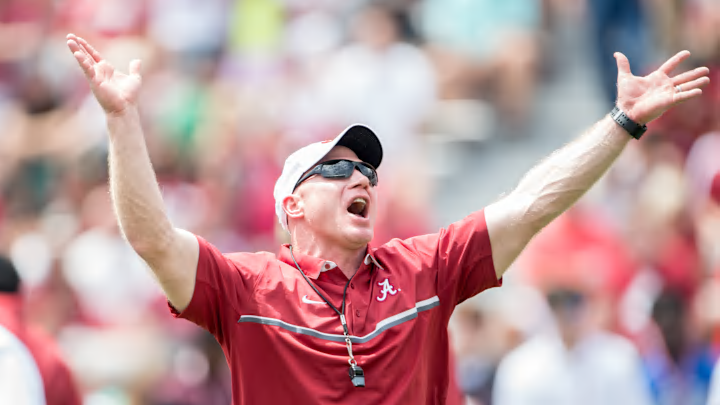If you were to build a successful football program right now, the first hire shouldn't be the offensive coordinator or even the new and glamorous title of general manager. The first hire for a brand-new college football head coach should be the strength and conditioning coach. It's the most important coach on the field outside of the head coach, and here are the three main reasons why.
1. Strength coaches give a major ROI
Injuries will kill wins faster than anything. Every year, there is a fast-rising or top-ranked program that suffers a couple of key injuries, and suddenly, they are no longer relevant, and losses pile up. You know which coach works to prevent injuries and even helps with the players who do get injured? The strength and conditioning coach.
Not to mention the ROI (return on investment) that comes from development, winning, and culture.
Speaking of return on investment, programs that pay more for strength coaches tend to have a better strength department and a more robust development pipeline. Elite Division 1 programs will pay an average salary of $130,000 to $400,000 for strength and conditioning coaches. However, across the board, that average salary is frustratingly low compared to other coaching positions, at $50,000.
This is incredibly low; it's on par with other assistant coaches (non-coordinator roles), who typically earn between $40,000 and $70,000 per year. For a coaching position that's absolutely crucial to the program's success, it's astonishing to pay only $50,000 a year. You can make more than that as a manager of the local McDonald's.
The elite programs that are paying mid-six figures for their strength and conditioning coaches are seeing an incredible ROI. Winning is money in college football, and a key component to winning is having a strong strength and conditioning program. Elite programs will pay mid-six figures for these positions and see the return in wins, which ultimately translates into more money.
It's an investment, but a worthwhile one for any program that wants to be elite.
2. Strength coaches shape the culture of a program
The head coach may set the vision and even workshop the best catchphrases, but it's the strength coach working day in and day out to instill discipline. It's the strength coach who preaches those catchphrases and shapes the culture. Especially in the offseason, when these strength coaches are getting tons of face time with the players.
Accountability, discipline, and leadership all come out of the day-to-day grind, not the highlight reels. Strength coaches are where they either learn those traits or have them ingrained in their minds.
3. Strength coaches are the development masterminds
True freshmen are rarely in shape, at least in the way they should be. They need to get fit in the right ways for their positions, and strength coaches know how to tailor workouts and development processes to make that true freshmen become a jacked sophomore.
Strength coaches are the ones who turn a 2-star recruit into a starter by senior year. Those long days in the weight room, the meal plans, the weight gain, the muscle build, all come on the back of a great strength coach.
The strength coach is one of the most essential coaches to hire for a team to have sustained winning and success. It's part of what Nick Saban of Alabama would say is part of his culture. Scott Cochran became a household name because he embodied the three traits above and helped Alabama become the Alabama we still think of today.
Yes, it was Nick Saban's coaching and leadership, but he had to have coaches like Cochran, or it never would have worked. In 2015, when Saban was able to retain Cochran at Alabama after some opportunities for Cochran to move on, Saban said this, "He's an important part of our program and does an outstanding job. The players really respond to him, and his role has been a big part of what we have been able to accomplish in terms of our success here both on and off the field."
The strength and conditioning coach is the most underrated hire in college sports, but it's actually the most important one.
